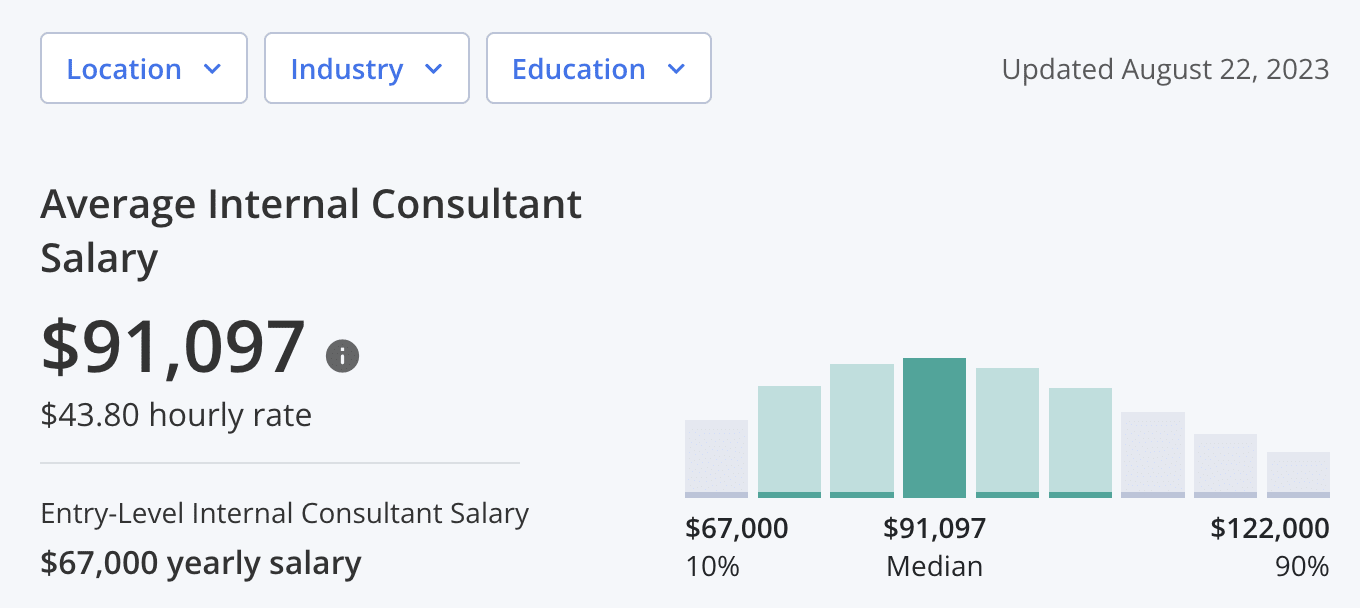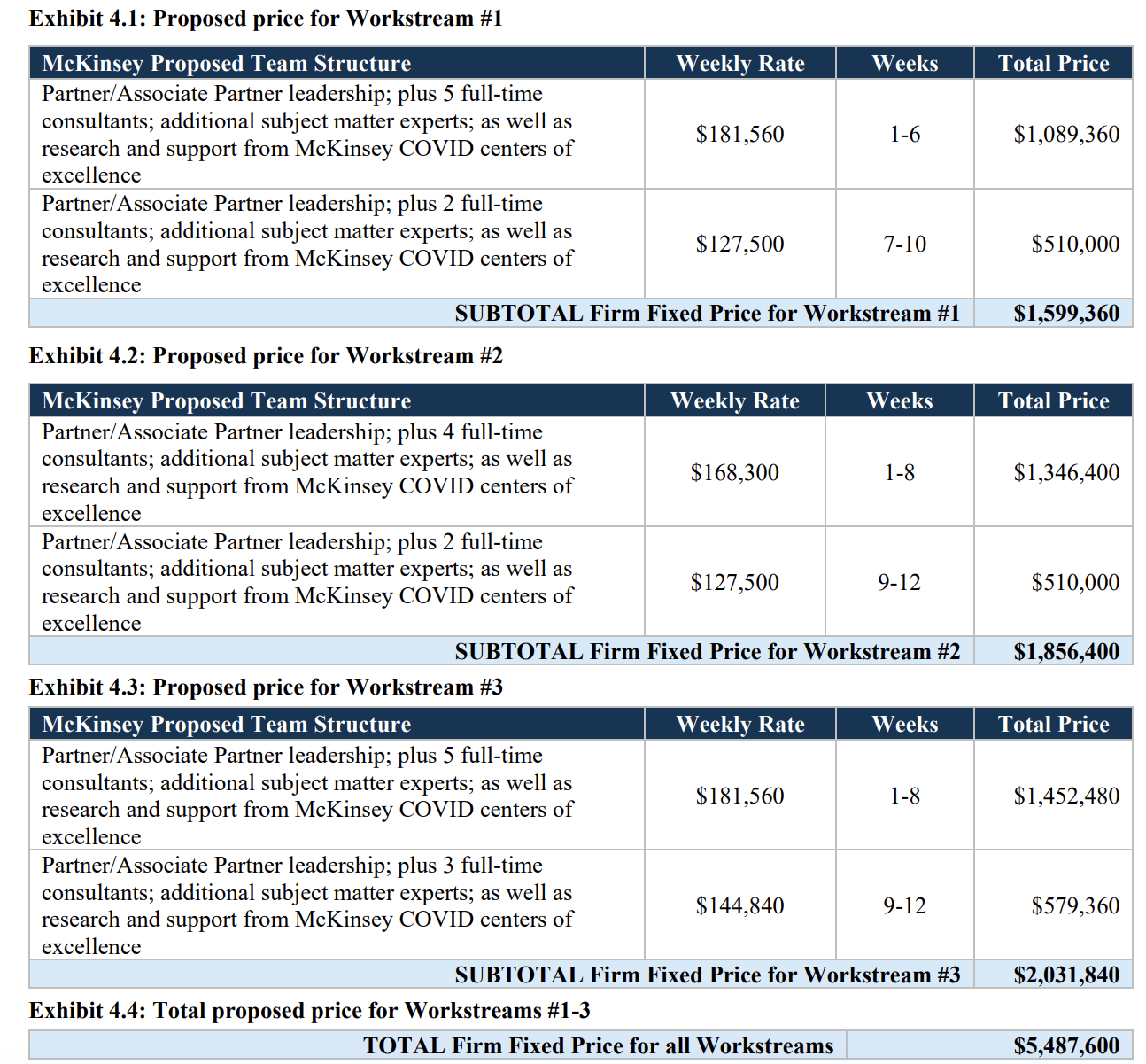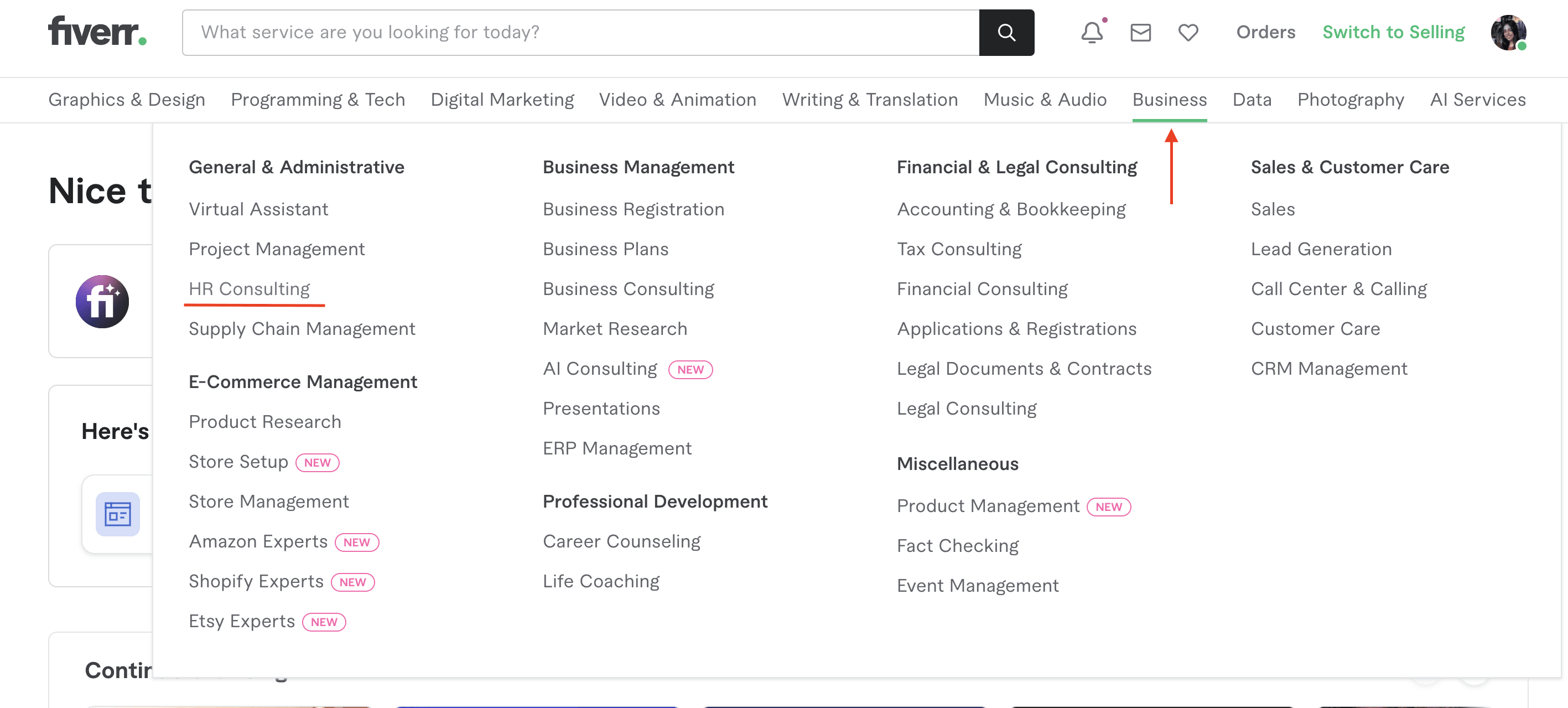6 Reasons to Hire External Consultants for Business Success in 2024
Discover how external consultants can improve efficiency, reduce costs, and boost overall business success, in comparison to internal teams.
 January 23, 2024
January 23, 2024 10 minute reading
10 minute reading
Scaling and expanding is the goal for most businesses. But where you draw your resources from can make all the difference.
Consultants offer more than just advice; they bring actionable strategies, hands-on expertise, and a results-driven approach to empower your business through a growth phase.
In the early stages, startups often face rapid growth, but may lack the resources to hire an internal consultant team. On the flip side, larger companies with multiple processes and projects find their internal consultants stretched too thin, making it challenging to concentrate on individual projects.
In cases like this, it may benefit your business to choose a temporary external consultant.
While internal and external consultants are both equipped with expertise for your field, key factors like budgets, team dynamics, and exposure can make external consultation a better choice for your organization.
Hire an expert HR Consultant on Fiverr
External consultant vs. internal consultants?
When you choose to hire an external consultant, you hire an independent industry expert to take on your project temporarily.
In contrast, internal consultants are long-term employees of the company. They’ll have a rich understanding of your company’s background and culture, as well as a close relationship with other employees. They’re naturally affiliated with multiple business units within the company, or more involved in day-to-day operations.
External consultants are temporary hires. They may not have a history with your company, but they bring a fresh perspective and experience from different clients—something your internal consultant may not be as exposed to.
Where do you find external consultants? They are hired through personal referrals, consulting firms, such as Mckinsey or Deloitte, or professional freelance platforms like Fiverr. They don’t belong to any unit or department of an organization and are only hired for a specific project with a predetermined timeline and scope of work.
Robert Brill, founder of Brill Media, a white-labeled buying agency, found an AI consultant on Tiktok. “I thought their content was interesting, and we could use their services. They helped us develop our first AI tool, implement it across our organization, sell our services based on the tool's output, and earn revenue from it.”
Hiring external consultants can offer a wide range of benefits for your business.
These can include:
Increasing your office productivity
Providing industry expertise
Bringing a fresh perspective
Making workflows efficient
Developing and implementing new policies
6 reasons to hire external consultants
Unlocking business success calls for a strategic blend of in-house expertise and external support.
External consultants bring specialized skills and a fresh outside perspective. They provide strategic planning and consulting services that internal consulting groups may overlook. These short-term engagements offer targeted solutions, aligning with the unique needs of stakeholders.
Let’s look at the top reasons to hire external consultants.
1. You want industry insight and innovative ideas
External consultants have worked with many businesses and projects before yours, offering hands-on experience and a honed skill set. Entrepreneurs can work with a startup business consultant to get mentorship on a specific problem.
Let’s say you need advice on scaling your e-commerce business. You’ve sold online services for years, but you’re ready to step into manufacturing and create retail products.
Instead of creating an internal growth strategy on your own, you can hire a business consultant with experience in the brick-and-mortar retail industry.
They'll analyze your current operations, find potential challenges, and create a customized plan for growth. This might include making your supply chain more efficient, improving production processes, and providing market analysis to ensure your products succeed in the competitive retail market.
Working with a consultant simplifies the process and ensures a smoother transition to the next level.
“Our consultant did a meticulous audit of our processes and provided valuable insights for improvement,” says Erik Pham, Founder and CEO of Health Canal, a health and wellness media company. “Their expertise and tailored strategies helped us optimize our sales funnel. Over six months, our conversion rate went from 1% to an impressive 3%.”
2. You don’t want a bias on internal dynamics
An outside consultant is unaware of ongoing office politics or internal dynamics. Without getting involved with or affected by internal conflicts, they can make quicker decisions, work more efficiently, and remain unbiased until the project ends.
External consultants are uniquely positioned to make recommendations for managerial positions that prioritize the overall success of the organization. That’s because they can consider factors like industry benchmarks, market trends, and best practices. Their independence allows them to focus on strategic decision-making, unburdened by internal biases.
In case of altercations, you can even hire a conflict resolution consultant to mediate and resolve any organizational dispute easily and improve internal team dynamics. Employees are naturally invested in internal matters, which may make these situations tricky for them to handle fairly.
Hiring, promotions, and conflict resolutions fall under the purview of an HR consultant. Small businesses can especially benefit from HR consulting because they rarely have the budget to have a full-time human resource team.
3. You want to train your internal employees
By hiring an outside consultant, not only do you get the skill set and expertise you require but also facilitate a transfer of knowledge to your current team. For the project's duration, a consultant will actively get to know the internal consulting team better and work closely with every member. With these interactions, they work on bringing positive change to their strategies, workflow, and problem-solving skills.
Since they’ve worked with several clients, they provide invaluable insights to your team, giving you a competitive edge no internal employee can provide. This collaboration can benefit your company, constantly challenging your employees, and exposing them to newer approaches and insights.
Another benefit of bringing external expertise into your team is learning to adapt to market changes and upcoming trends. This proactive approach enables your team to stay ahead of the curve, creating a culture of continuous learning and adaptability.
4. You cannot afford to hire a full-time internal consultant

Average internal consultant salary
The average cost of hiring an entry-level internal consultant is $67,000 annually. A more experienced consultant is considerably higher.
The larger the company, the more departments and processes are involved—which also increases the cost of hiring a full-time employee.
So when you have a one-time project, hiring an internal consultant team or an internal project management consultant may not be the most cost-effective decision, considering the years of industry experience and specialization you’re paying for.
On the other hand, external consultants are only paid according to the project they’re hired for. Unlike an employee who receives a monthly salary, benefits, bonuses, severance, and more—consultants get paid a flat fee once the project is complete.
That’s not to say external consulting is always cheaper.
Here’s what McKinsey Consulting proposed to the State of New Jersey.

McKinsey budget proposal to state of New Jersey.
However, independent external consultants can work out more affordably compared to an internal consultant—depending on the engagement period and project scope.
It’s also easier to either shorten or extend an external employee’s retainer according to your budgets and requirements.
In the long run, sourcing an external expert is cheaper, especially for a small business that doesn’t have the budget to hire a team.
5. You want undivided attention on a specific project
Most internal consultants and employees are most likely working on multiple projects simultaneously. By hiring an external expert, you get a consultant with the exact expertise needed for that project and the time.
Internal consultants may not provide this undivided attention as they cater to other unavoidable office responsibilities or smaller initiatives.
For example, let’s say your business is trying to expand its service offerings and tap into an entirely new industry. Instead of appointing an internal team lead, it’s advisable to hire a marketing and sales consultant with specialized experience in the new industry you’re trying to explore.
It’s also more organized and efficient to delegate large, specialized projects to external consultants so that internal consultants can take care of generic, company-centric matters properly.
6. You want transparent budgeting and costing
A successful consultant will always use platforms such as Onsiter VMScan to keep a detailed track of hours worked, tasks completed, and more. The scope of work is usually clearly defined and agreed upon before the start of the project, along with the cost. Most consultants may work on a flexible retainer as well, making it easier to reduce or increase a consultancy cost.
On the other hand, most consulting companies don’t have the most transparent costing system. Larger consulting firms rarely disclose their fee structure and often charge flat rates that will not reflect the quantity of work put in.
In unavoidable circumstances like a change in your project brief requirements, it’s always easier to work with an independent external consultant who will make their suggestions and give you a realistic and transparent charging structure.
How to hire an external consultant easily for your business with Fiverr
Step 1: Log in or create a Fiverr account.

Step 2: Once logged in, check the Business section and select the type of consultation service you’re looking for. As an example, we’ve clicked on HR consultation services.

Step 3: Fiverr will immediately show you the top-rated HR consultation experts. You can also shortlist consultations. From the type of service, your budget, the consultant’s rating and their delivery time—you can use the filters to specify the results according to your exact requirements.

Step 4: We clicked on Athina’s profile as it showed great ratings and the ‘Fiverr’s Choice’ budget.
Once you click on a profile, you can read more about their specialization and work experience. Ensure you check out their reviews, past projects, and pricing plans to see if they align with your company’s needs.

Step 5: Once you’ve finalized a candidate, select which type of service you’d want, according to your budget. You can always contact them for any queries or further information! Click continue to place your order request.

Step 6: Once the freelancer has accepted your order, they’ll get back to you via Fiverr’s messenger to get started on the project!
“Our work with different Fiverr consultants significantly boosted various aspects of the
business,” says Dylan Hoffman, Co-Founder of Swivvl, an AI logistics company. “We increased monthly revenue from research projects by $2,000 and improved website traffic. Digital consultant strategies aided in growing my LinkedIn connections to 3,500.”
How much do external consultants cost?
External consultants can either charge an hourly fee or a project-based retainer fee.
As a company, you should ideally decide on your budget beforehand to find a suitable consultant.
For this guide, we’re looking at how much independent external consultants cost—since consulting agencies greatly vary in cost and are often out of reach for SMBs.
Consulting firms, particularly the big 4 (PwC, Deloitte, EY, and KPMG) have the highest fees in the market, and exact figures are hard to come by in the public domain.

Typically, consultancy fees can range from $150 and $1,000 per hour, averaging at $180 an hour, depending on the type of work and years of experience.

If your project is extremely important and you require years of industry experience to guide your team, you may not want to compromise on the expert you hire. External consultants are temporary hires, making your project-based expenses more affordable than maintaining permanent internal consulting over time.
Types of consultation services you can hire for your business
Both external and internal consultants specialize in various aspects of a business, such as Public Relations, Corporate, and Management. Here’s a quick round-up on the types of consultants available for your business.
Public Relations Consultants: Any service that maintains a business’s public image falls under public relations consultancy.
Social media Consulting: Assist a brand in building its online presence, and ideate campaigns to reach the right audience via social media platforms
Image Consulting: Guide companies in improving or maintaining a certain reputation
Marketing Consulting: Analyse current marketing plans and develop new marketing strategies
Media Relations Consultants: Focus on building and maintaining positive relationships between the organization and the media, such as crafting press releases, organizing press conferences, and facilitating interviews.
Consumer Relations consultants: Manage the organization's relationship with its customers such as addressing customer feedback, handling complaints, and enhancing customer satisfaction
Corporate Consultants: For policies, business-to-business (B2B) projects, and programs, corporate consultant roles consisting of:
Business consulting: Provide expertise in a company’s model and structure
IT Consulting: Improve digital strategy, and IT systems and oversee initiatives across all company hardware and software.
Sales Consulting: Assist companies in boosting sales and increasing revenue.
Change Management Consulting: Help organizations navigate and implement changes, ensuring smooth transitions, and minimizing employee resistance.
Risk Management Consulting: Identify and mitigate potential risks to a business, developing strategies to safeguard against financial, operational, and reputational risks.
Management Consultants: Management helps enhance internal operations, strategies, and techniques. This includes:
Human Resources Consulting: Specializing in recruitment, training, employee relations, and other human-resource projects.
Finance Consulting: Expertise in financial planning, risk management, and budgeting services.
Operations Consulting: Upgrading an organization’s operational structure to improve efficiency
Project Management Consultants: Offer expertise in project management methodologies, tools, and best practices to ensure successful project delivery.
How to ensure business success post-consultation
What does a successful post-consultation look like?
Your pre-determined goals were achieved, and your external consultant’s proposed plans were seamlessly integrated into your business practices.
How do you accomplish this?
It starts by establishing regular check-ins and updates during the consultancy period. Be involved in the consultant’s decision-making processes, which can help you address any concerns immediately.
Once the project is over, make sure you evaluate your return on investment (ROI) from this hire on your business. For example, look at financial or operational efficiency metrics or even customer satisfaction feedback.
Ensure that the consultant’s advice and recommendations are incorporated within your internal team's daily workflow. A few questions you could ask yourself are:
Did the consultant positively or negatively impact the workplace?
What changes did they recommend?
How do we sustain those changes?
Finally, if the project was successful and you’ve received great feedback—you should maintain a long-term relationship with your consultant, in case you want to rehire them for a future project!
Find the right consultant for your business on Fiverr
As you work towards growing your business, you realize that delegating tasks, especially ones outside your area of specialization, becomes a necessity.
Accessing the expertise you need is easy and quick on a freelancer marketplace.
On Fiverr, you get access to external consultants across industries. You can view detailed profiles with verified reviews and past project testimonials to find the right consultant for your business. Fiverr also provides a messaging platform to communicate with a potential candidate effectively, as well as a trustworthy payment platform that protects your best interests.
“Working with external consultants through platforms like Fiverr really streamlined our project
collaboration,” says Hoffman. “It was incredibly user-friendly—communicating with contractors was straightforward, and giving feedback was hassle-free.”
Hire an expert HR Consultant on Fiverr
Choose from a pool of experienced and trustworthy freelance consultants. Sign up to Fiverr to hire an external consultant today.
